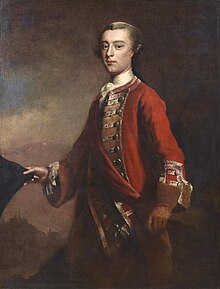James Wolfe
| James Wolfe | |
|---|---|

"Major General Wolfe.
Who, at the Expence of his Life, purchas'd immortal Honour for his Country, and planted,with his own Hand, the British Laurel, in the inhospitable Wilds of North America, By the Reduction of Quebec, Septr. 13th. 1759." |
|
| Born |
2 January 1727 Westerham, Kent, England |
| Died | 13 September 1759 (aged 32) Quebec, New France |
| Buried at | St Alfege Church, Greenwich |
| Allegiance |
|
| Service/branch |
|
| Years of service | 1740–1759 |
| Rank | Major General |
| Commands held | 20th Regiment of Foot |
| Battles/wars | |
| Relations | Lieutenant General Edward Wolfe (father) |
| Signature | |
Major General James Wolfe (2 January 1727 – 13 September 1759) was a British Army Officer, known for his training reforms but remembered chiefly for his victory over the French at the Battle of the Plains of Abraham in Canada in 1759. The son of a distinguished general, Edward Wolfe, he had received his first commission at a young age and saw extensive service in Europe where he fought during the War of the Austrian Succession. His service in Flanders and in Scotland, where he took part in the suppression of the Jacobite Rebellion, brought him to the attention of his superiors. The advancement of his career was halted by the Peace Treaty of 1748 and he spent much of the next eight years on garrison duty in the Scottish Highlands. Already a brigade major at the age of eighteen, he was a lieutenant-colonel by the age of twenty-three.
The outbreak of the Seven Years' War in 1756 offered Wolfe fresh opportunities for advancement. His part in the aborted raid on Rochefort in 1757 led William Pitt to appoint him second-in-command of an expedition to capture the Fortress of Louisbourg. Following the success of the Siege of Louisbourg he was made commander of a force which sailed up the Saint Lawrence River to capture Quebec City. After a long siege Wolfe defeated a French force under Marquis de Montcalm allowing British forces to capture the city. Wolfe was killed at the height of the Battle of the Plains of Abraham due to injuries from three musket balls.
...
Wikipedia
